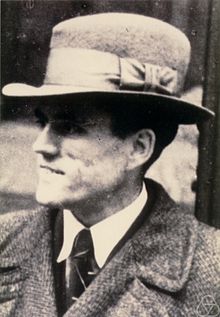Gerhard Gentzen
Gerhard Gentzen | |
|---|---|
 Gerhard Gentzen in Prague, 1945. | |
| Born | November 24, 1909 |
| Died | August 4, 1945 (aged 35) |
| Nationality | German |
| Alma mater | University of Göttingen |
| Scientific career | |
| Fields | Mathematics |
| Doctoral advisor | Paul Bernays |
Gerhard Karl Erich Gentzen (November 24, 1909 – August 4, 1945) was a German mathematician and logician. He made major contributions to the foundations of mathematics, proof theory, especially on natural deduction and sequent calculus. He died in 1945 after the Second World War, because he was deprived of food after being arrested in Prague.
Contents
Life and career[edit]
Gentzen was a student of Paul Bernays at the University of Göttingen. Bernays was fired as "non-Aryan" in April 1933 and therefore Hermann Weyl formally acted as his supervisor. Gentzen joined the Sturmabteilung in November 1933 although he was by no means compelled to do so.[1] Nevertheless he kept in contact with Bernays until the beginning of the Second World War. In 1935, he corresponded with Abraham Fraenkel in Jerusalem and was implicated by the Nazi teachers' union as one who "keeps contacts to the Chosen People." In 1935 and 1936, Hermann Weyl, head of the Göttingen mathematics department in 1933 until his resignation under Nazi pressure, made strong efforts to bring him to the Institute for Advanced Study in Princeton.
Between November 1935 and 1939 he was an assistant of David Hilbert in Göttingen. Gentzen joined the Nazi Party in 1937. In April 1939 Gentzen swore the oath of loyalty to Adolf Hitler as part of his academic appointment.[2] From 1943 he was a teacher at the University of Prague.[3] Under a contract from the SS Gentzen evidently worked for the V-2 project.[4]
Gentzen was arrested during the citizens uprising against the occupying German forces on May 5, 1945. He, along with the rest of the staff of the German University in Prague was subsequently handed over to Russian forces. Because of his past association with the SA, NSDAP and NSD Dozentenbund, Gentzen was detained in a prison camp, where he died of malnutrition on August 4, 1945.[5][6]
Work[edit]
Gentzen's main work was on the foundations of mathematics, in proof theory, specifically natural deduction and the sequent calculus. His cut-elimination theorem is the cornerstone of proof-theoretic semantics, and some philosophical remarks in his "Investigations into Logical Deduction", together with Ludwig Wittgenstein's later work, constitute the starting point for inferential role semantics.
One of Gentzen's papers had a second publication in the ideological Deutsche Mathematik that was founded by Ludwig Bieberbach who promoted "Aryan" mathematics.[7]
Gentzen proved the consistency of the Peano axioms in a paper published in 1936. In his Habilitationsschrift, finished in 1939, he determined the proof-theoretical strength of Peano arithmetic. This was done by a direct proof of the unprovability of the principle of transfinite induction, used in his 1936 proof of consistency, within Peano arithmetic. The principle can, however, be expressed in arithmetic, so that a direct proof of Gödel's incompleteness theorem followed. Gödel used a coding procedure to construct an unprovable formula of arithmetic. Gentzen's proof was published in 1943 and marked the beginning of ordinal proof theory.
Publications[edit]
- "Über die Existenz unabhängiger Axiomensysteme zu unendlichen Satzsystemen". Mathematische Annalen. 107 (2): 329–350. 1932. doi:10.1007/bf01448897.
- "Untersuchungen über das logische Schließen. I". Mathematische Zeitschrift. 39 (2): 176–210. 1935. doi:10.1007/bf01201353.
- "Untersuchungen über das logische Schließen. II". Mathematische Zeitschrift. 39 (3): 405–431. 1935. doi:10.1007/bf01201363.
- Gentzen, Gerhard (1936). "Die Widerspruchsfreiheit der Stufenlogik". Mathematische Zeitschrift. 41: 357–366. doi:10.1007/BF01180425.
- Gentzen, Gerhard (1936). "Die Widerspruchsfreiheit der reinen Zahlentheorie". Mathematische Annalen. 112: 493–565. doi:10.1007/BF01565428.
- "Der Unendlichkeitsbegriff in der Mathematik. Vortrag, gehalten in Münster am 27. Juni 1936 am Institut von Heinrich Scholz". Semester-Berichte Münster: 65–80. 1936–1937. (Lecture hold in Münster at the institute of Heinrich Scholz on 27 June 1936)
- "Unendlichkeitsbegriff und Widerspruchsfreiheit der Mathematik". Actualités scientifiques et industrielles. 535: 201–205. 1937.
- "Die gegenwärtige Lage in der mathematischen Grundlagenforschung". Deutsche Mathematik. 3: 255–268. 1938.[8]
- "Neue Fassung des Widerspruchsfreiheitsbeweises für die reine Zahlentheorie". Forschungen zur Logik und zur Grundlegung der exakten Wissenschaften. 4: 19–44. 1938.[8]
- Gentzen, Gerhard (1943). "Beweisbarkeit und Unbeweisbarkeit von Anfangsfällen der transfiniten Induktion in der reinen Zahlentheorie". Mathematische Annalen. 119: 140–161. doi:10.1007/BF01564760.
Posthumous[edit]
- "Zusammenfassung von mehreren vollständigen Induktionen zu einer einzigen". Archiv für mathematische Logik und Grundlagenforschung. 2 (1): 81–93. 1954.
- Gentzen, Gerhard (1974). "Der erste Widerspruchsfreiheitsbeweis für die klassische Zahlentheorie". Archiv für mathematische Logik und Grundlagenforschung. 16 (3–4): 97–118. doi:10.1007/BF02015370. – Published by Paul Bernays.
- Gentzen, Gerhard (1974). "Über das Verhältnis zwischen intuitionistischer und klassischer Arithmetik". Archiv für mathematische Logik und Grundlagenforschung. 16 (3–4): 119–132. doi:10.1007/BF02015371. – Published by Paul Bernays.
See also[edit]
Notes[edit]
- ^ Menzler-Trott, p. 52.
- ^ Menzler-Trott, p. 119.
- ^ Gerhard Gentzen at math.muni.cz
- ^ Menzler-Trott, p. 238.
- ^ Menzler-Trott, p. 273 ff.
- ^ http://www-history.mcs.st-and.ac.uk/Biographies/Gentzen.html
- ^ Dipl.Math. Walter Tydecks, Neuere Geschichte der Mathematik in Deutschland (in German)
- ^ a b Rosser, J. Barkley (1939). "Review of Die gegenwärtige Lage in der mathematischen Grundlagenforschung. Neue Fassung des Widerspruchsfreiheitsbeweises für die reine Zahlentheorie by Gerhard Gentzen". Bull. Amer. Math. Soc. 45: 812–813. doi:10.1090/S0002-9904-1939-07067-5.
References[edit]
- Gentzen, Gerhard (1969), M. E., Szabo, ed., Collected Papers of Gerhard Gentzen, Studies in logic and the foundations of mathematics (Hardcover ed.), North-Holland, ISBN 0-7204-2254-X - (English translation).
- Menzler-Trott, Eckart (2001-08-01), Gentzens Problem: Mathematische Logik im nationalsozialistischen Deutschland, Basel, Switzerland: Birkhäuser Verlag, ISBN 3-7643-6574-9
- Menzler-Trott, Eckart (November 21, 2007), Logic's Lost Genius: The Life of Gerhard Gentzen, History of Mathematics, vol. 33, translated by Griffor, Edward; Smorynski, Craig, American Mathematical Society, ISBN 978-0-8218-3550-0 - an English translation.